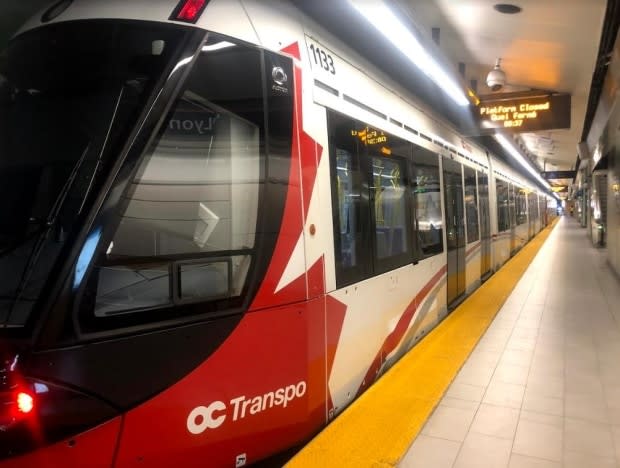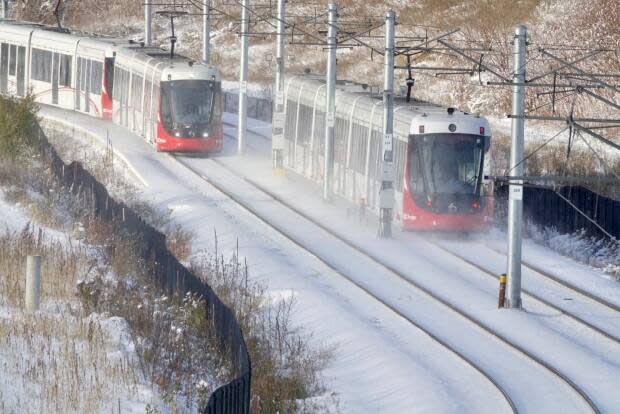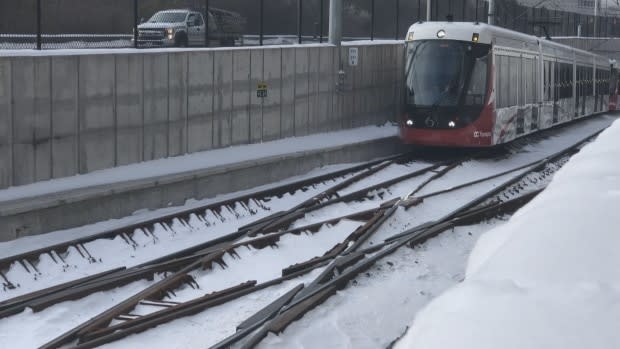Ottawa transit boss 'concerned' by frequency of LRT foul-ups
Ottawa's transit boss has often said he expected the city's four-month-old LRT system to suffer growing pains, but John Manconi admitted Thursday even he's surprised by how frequently serious flaws have been cropping up.
"All these things — door issues, flats, slippage — those are all normal. The issue is the frequency," transportation general manager, John Manconi, told an emergency meeting of the transit commission.
On Monday, consultants from JBA Corp. will arrive to tackle a long list of problems, and to look at how Rideau Transit Maintenance (RTM) has been handling them.
The tipping point for Manconi came New Year's Eve, he said. Following a "good run" that lasted several weeks, trains suddenly trains lost power just as the free holiday service was beginning.
It turned out the electrical apparatus on the train rooftop was caked in carbon and salt that had dripped from road overpasses. RTM stepped up its cleaning regimen as a result.
But it turned out to be just the first of many problems to beset the LRT in the new year. Here's some of what transit commissioners learned Wednesday during a special meeting called to discuss the issues.
Wheels aren't round
Transit managers can't remember this ever happening on the north-south Trillium Line, but many new electric Alstom trains on the Confederation Line are suddenly developing flat spots on their steel wheels.
"You would hear an audible noise when you're riding the train. It would be a repetitive thump," RTM's Peter Lauch explained.
RTM employees are working day and night at the garage to scrape the wheels over lathes and make them round again.
At one point, 13 trains had "wheel flats", said Lauch. Wheels were the single biggest reason for this week's shortage of trains.
Braking hard and skidding even once can cause a wheel to lose its roundness, explained Matthew Slade, who works on Ottawa's LRT for Rideau Transit partner EllisDon. The safety system could be triggering emergency brakes, he posited.
"The likelihood of the wheels locking up is higher in winter. Same with your car, when there's snow on the ground your [anti-lock brakes] will operate when you come to a stop more frequently," Slade said.
Where are the 17 trains?
We've had a shortage of working trains in the past week, with the worst day seeing just eight trains carrying passengers during the morning rush hour, instead of the usual 13.
The $2.1 billion contract for Stage 1 included 34 vehicles, coupled into pairs to form a fleet of 17 trains. So where are they?
On Thursday, transit staff confirmed that all 17 were ready for service when the city accepted the new train system last August. All have been out on the line at some point.

At any given time, however, three trains are being worked on in some way, including one undergoing serious maintenance.
"Right now, the one that's in heavy maintenance is literally up on jacks," said Lauch.
That leaves 13 usually available for rush-hour service, plus one in reserve. And while the morning and afternoon peak periods have so far operated with 13 trains, the goal is to soon increase that to 14.
Winter struggles
Five times in January, switches that allow trains to move between tracks had problems, which caused train delays for riders. French train-maker Alstom is responsible for the switches.
"The majority of the issues we've had have been weather-related," explained Lauch. When a storm is at its height, ice gets packed between the rail and the moving piece, called a tongue.
Manconi expects the external rail experts will look at improving the electric heaters at the switches.
Councillors asked about the Trillium Line, which doesn't experience such issues, and learned those switch heaters are powered by natural gas or propane. They may also be of a higher quality.

Manconi's boss has his back
There have been mounting calls for some of those in charge at city hall to lose their jobs over the LRT mess.
Earerlis this week, citizen transit commissioner Leah Williams told CBC she thinks it should be Manconi who resigns.
But Manconi and his team "aren't going anywhere," according to city manager Steve Kanellakos, Manconi's boss.

He praised and defended Manconi and his team, saying "they're pulling miracles out there."
If councillors someone should take the fall, Kanellakos said it should be him.
"If you're taking out leadership, you take out me. I am ultimately accountable. Look at the [organizational] chart and you'll see my face on it. I'm accountable to council — I'm your only employee."


